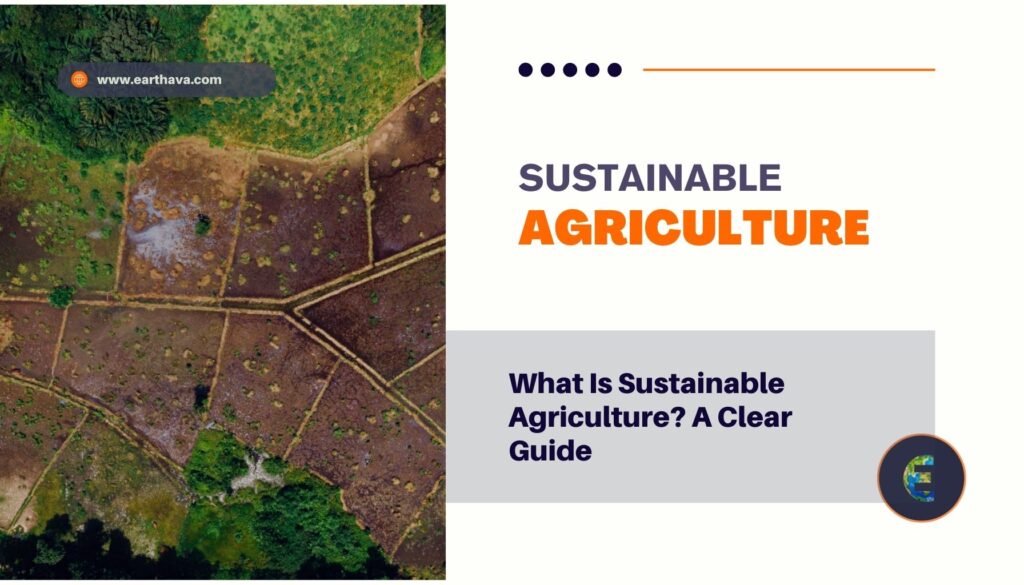What is sustainable agriculture? It’s a way of farming that meets today’s food needs without compromising the environment, natural resources, or future generations. From soil health and water conservation to fair labor practices, sustainable agriculture balances productivity with long-term resilience.

It’s hard to imagine where humanity would be without agriculture. Thousands of years ago, global populations grew rapidly as the practice of agriculture spread across the world. At the same time, nomadic lifestyles fell out of favor, and humans found greater autonomy. The concept of civilization as we know it wouldn’t be possible without the advent of agriculture, and it remains a crucial aspect of modern life.
Unfortunately, 21st-century agriculture looks vastly different from the farming practices of early humans. While the use of pesticides is nothing new (the ancient Chinese used wood ash to deter insects, for example), chemical pesticides are exponentially more harmful than nature-based pest control. Around the world, about 5.6 billion pounds of pesticides are used every year, on every crop imaginable.
That reliance on pesticides is causing serious harm to the Earth, in addition to poisoning 25 million agricultural workers annually. The widespread use of monoculture farming necessitates the rampant use of pesticides while simultaneously depleting soil health. Monoculture is a broken system that undermines biodiversity. The good news is that plenty of sustainable options exist, such as organic farming and polyculture.
As the effects of climate change become more apparent, we need to take a hard look at how our current agricultural system is unsustainable. It’s time to prioritize sustainability for the health of the Earth and humanity as a whole.
Humanity and Agriculture: A Symbiotic Relationship
Throughout history, humans have manipulated the natural world in various ways, from building dams and reservoirs to purposefully growing crops. The earliest evidence of agriculture dates back some 23,000 years, according to researchers, and full-scale farming methods were in use by about 10,000 BCE.
The development of agriculture effectively changed humanity: For the first time, humans weren’t solely dependent on the whims of nature when looking for something to eat. Our symbiotic relationship with nature continues to this day, as urban and rural areas alike look inward for sustainable food production methods.
In the nation’s most sustainable cities, various policies and procedures exist regarding locally sourced food. Seattle’s Office of Sustainability & Environment, for example, considers food policy and programs of paramount importance when it comes to city-wide sustainability efforts. Sustainable food policies can vary considerably and may emphasize locally sourced food and the importance of preserving biodiversity via sustainable agriculture.
Moving Away From Monoculture
Even in agriculture’s earliest days, our farming ancestors understood the importance of soil rotation as it relates to biodiversity. While they used much different terminology, the world’s first farmers quickly discovered that polyculture methods yielded healthier crops and soil conditions, especially when three or four crops were rotated in a predetermined cycle.
Monoculture, on the other hand, is effectively the antithesis of biodiversity and creates various problems throughout several growing seasons. Under the monoculture farming system, the same crops are planted in the same soil, year after year. Farmers typically see consistently high yields, but they come with a hefty price: Monoculture farming can lead to pest problems, soil degradation, overproduction, and climate change. What’s more, the harmful pesticides used in monoculture pollute groundwater supplies, adversely altering the surrounding ecosystem.
We must push monoculture out of the picture entirely if we have any hope of healing the damage already done to the natural environment. As previously mentioned, polyculture is a sustainable alternative to monoculture. And the best part? The viability of polyculture has been tested over millennia, in every growing condition on Earth.
Taking Small Steps to Heal the Planet
At its roots, agriculture is a small-scale, local endeavor that helps bring communities together and fosters a healthy overall lifestyle. Globalization and the free market have taken that intimacy out of agriculture, creating myriad problems as a result. For the health of the planet, localized farming should be emphasized at every level of production.
Consumers should be especially mindful of their food’s origin and purchase locally grown, sourced, and produced foods whenever possible. Further, it should be noted that sustainable agriculture is dependent on climate and planting zones. Also known as USDA Plant Hardiness Zones, planting zones are regions of the country that are divided based on weather patterns, as well as the ability of plants to survive in a particular climate. Understanding the nuances of hardiness zones is crucial to implementing a large-scale, locally sourced food system.
But the benefits of going local don’t end there: Local farming can help to drastically reduce the amount of harmful fossil fuels used to transport crops across the globe. In addition, local farming can lessen the exorbitant amount of food waste produced annually: Up to 40% of all food produced around the world eventually ends up as non-saleable waste under monoculture. If we have any hope of lessening that number, sustainability must become the backbone of future global food systems.
Key Takeaways
As humans face an uncertain future post-COVID, learning how to grow your food is an attractive option. Sustainable agriculture starts in your own backyard. By making mindful, localized agricultural choices that promote healing, we can help ensure the future survival of humanity and of the natural world.


